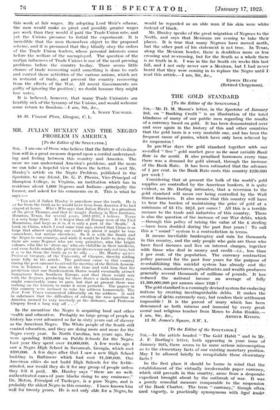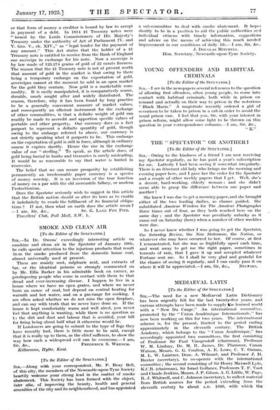[To the Editor of the SPECTATOR.] Sia,—In the article headed
" The Gold Habit " and in Mr. J. F. Darling's letter, both appearing in your issue of JanuarY 10th, there seems to be some serious misconception . as to the elementary facts of our existing monetary position. May I be allowed briefly to recapitulate these elementary facts ?
In the first place it should be borne in mind that the establishment of the virtually irredeemable paper currency, which still prevails in this country, arose from a desperate expedient brought about by the outbreak of war. It was . a purely remedial measure comparable to the suspension of the Bank Charter. The term '" currency," though often used vaguely,, is practically synonymous with legal tender .
or that form of money a creditor is bound by law to accept in payment of a debt. In 1914 £1 Treasury notes were
" issued by the Lords Commissioners of His Majesty's Treasury under the authority of Act of Parliament IV. and V. Geo. V., ch. XIV.," as " legal tender for the payment of any amount." This Act states that the holder of a £1 Treasury note is entitled to receive from the Bank of England one sovereign in exchange for his note. Now a sovereign is by law made of 123.274 grains of gold of 22 carats fineness. The reason that the 21 Treasury note is not at present worth that amount of gold in the market is that owing to there being a temporary embargo on the exportation of gold, sovereigns cannot at the moment be sold in an open market for the gold they contain. Now gold is a marketable com- modity. It is easily manipulated, it is comparatively scarce, durable, much sought after and widely distributed. The reason, therefore, why it has been found by long practice to be a generally convenient measure of market values, and consequently an efficient instrument for the exchange of other commodities, is that a definite weight of gold can readily be made to accredit and apportion specific values of portable and other property. Our currency does as a fact purport to represent a definite quantity of gold, though owing to the embargo referred to above, our currency is not strictly speaking what it purports to be. This embargo on the exportation of gold is still in force, although in ordinary course it expires shortly. Hence the rise in the exchange value of our " sterling." To speak, as the article does, of gold being buried in banks and treasuries is surely misleading. It would be as reasonable to say that water is buried in reservoirs.
The belief that we can secure prosperity by establishing permanently an irredeemable paper currency is a species of money worship. It is an inversion of the true function of money on a par with the old mercantile fallacy, or modern Protectionism.
Does the Spectator seriously wish to suggest in this article that the British nation should so alter its laws as to enable it indefinitely to evade the fulfilment of its financial obliga- tions ? If not, then what on earth does the article mean ?











































 Previous page
Previous page